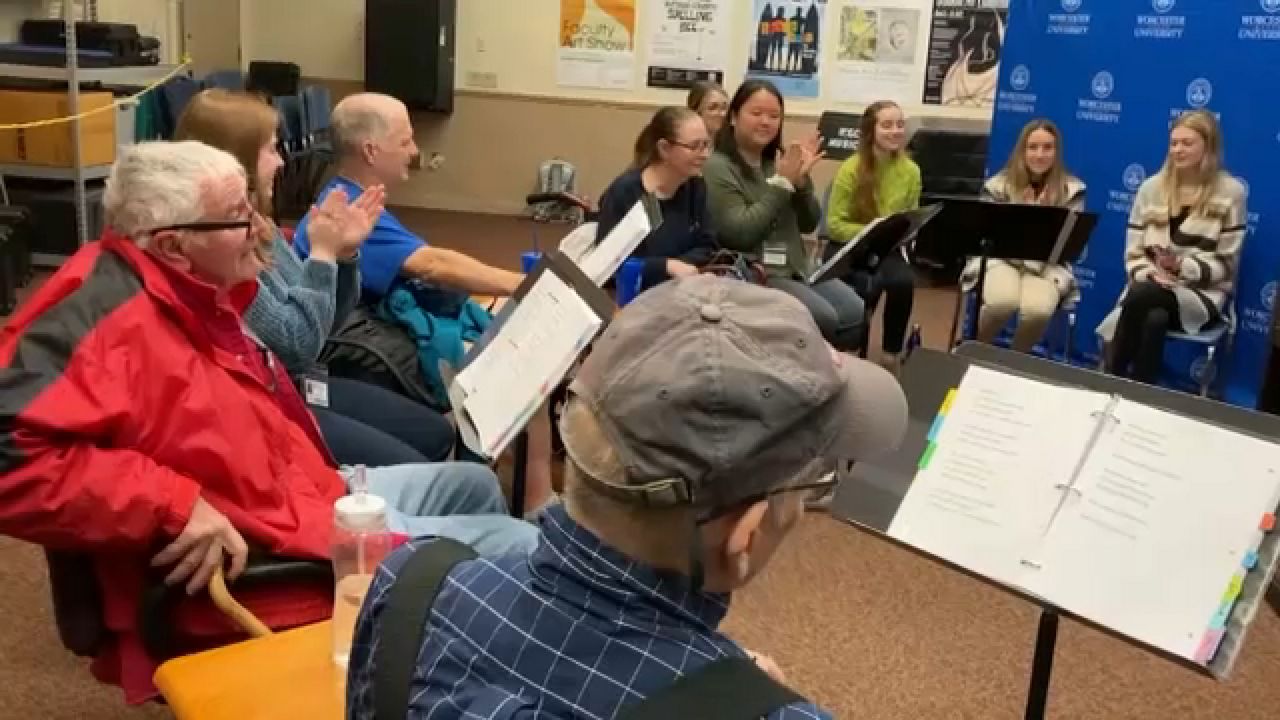WORCESTER, Mass. - Worcester State University is using the power of performing arts to help people deal with the physical and emotional toll of Parkinson’s disease with a weekly singing program.
What You Need To Know
- A weekly singing program at Worcester State is helping people with Parkinson's disease
- Research shows singing helps with respiratory control and creates a sense of unity
- Worcester State University students also help with the program
- On Thursday, the group sang Christmas carols together
The program is a collaboration between the Department of Communication Sciences and Disorders and the Department of Visual and Performing Arts. Students and staff meet weekly with people with Parkinson’s disease and perform music together.
Steve Gagliastro, a performing arts professor at Worcester State University, keeps the momentum going during these weekly sessions by bringing plenty of energy and guiding his class through a range of vocal exercises.
“We’re really excited as musicians to be involved in this, because when do you ever hear someone say, ‘Is there a musician in the house?,' we’re actually able to give back, and provide a true, serious therapy and an improvement of quality of life for our clients who come in,” Gagliastro said.
For people living with Parkinson’s disease, relief from its symptoms can be difficult to find. While physical therapy and exercise can help with the tremors and stiffness this progressive illness causes, many feel a patient's difficulty in breathing or their voice impairments are best addressed by the simple joy of song.
“It really extends not only the quality of life, but it's an extender of life,” Gagliastro said. “Parkinson’s is a degenerative disease, so there's no stopping it. But to put a hold, or at least to maintain and increase the levels of communication with singing and with this project, it absolutely improves across the board.”
Researchers at Iowa State University have found singing not only helps with Parkinson’s patients’ respiratory control, but the act of singing with a group of people facing similar challenges creates a shared sense of unity and belonging.
“The patients that we work with sometimes experience a crisis in terms of their ability to communicate, their ability to connect with the world is taken from them,” said Andrea Quinn, director of the Department of Communication Sciences and Disorders. “We're helping people in this time of crisis.”
Worcester State University students have also been a big part of the program’s success so far, and seeing the impact a simple song can have on a person’s well-being is rewarding work.
“The clients that we're working with sometimes can’t find the motivation to go out and do the things that other people do in their days and find connections with other people.,” said Hannah Picchioni. “This group really provides them an opportunity to do that. And it's just been really rewarding to kind of see the joy that they've gotten from singing with each other.”
These weekly gatherings are a dose of harmony during what can often be a disorienting time in these patients’ lives, and department chair Kristina Curro said it’s important for students to see the power of breaking through communication barriers.
“To generate the awareness, the compassion, and then maybe down the road, the initiative to make the world a better place for everybody, so that everybody has the opportunity to communicate in whatever way that's effective for them,” Curro said. “To be accepted and part of their community.”



